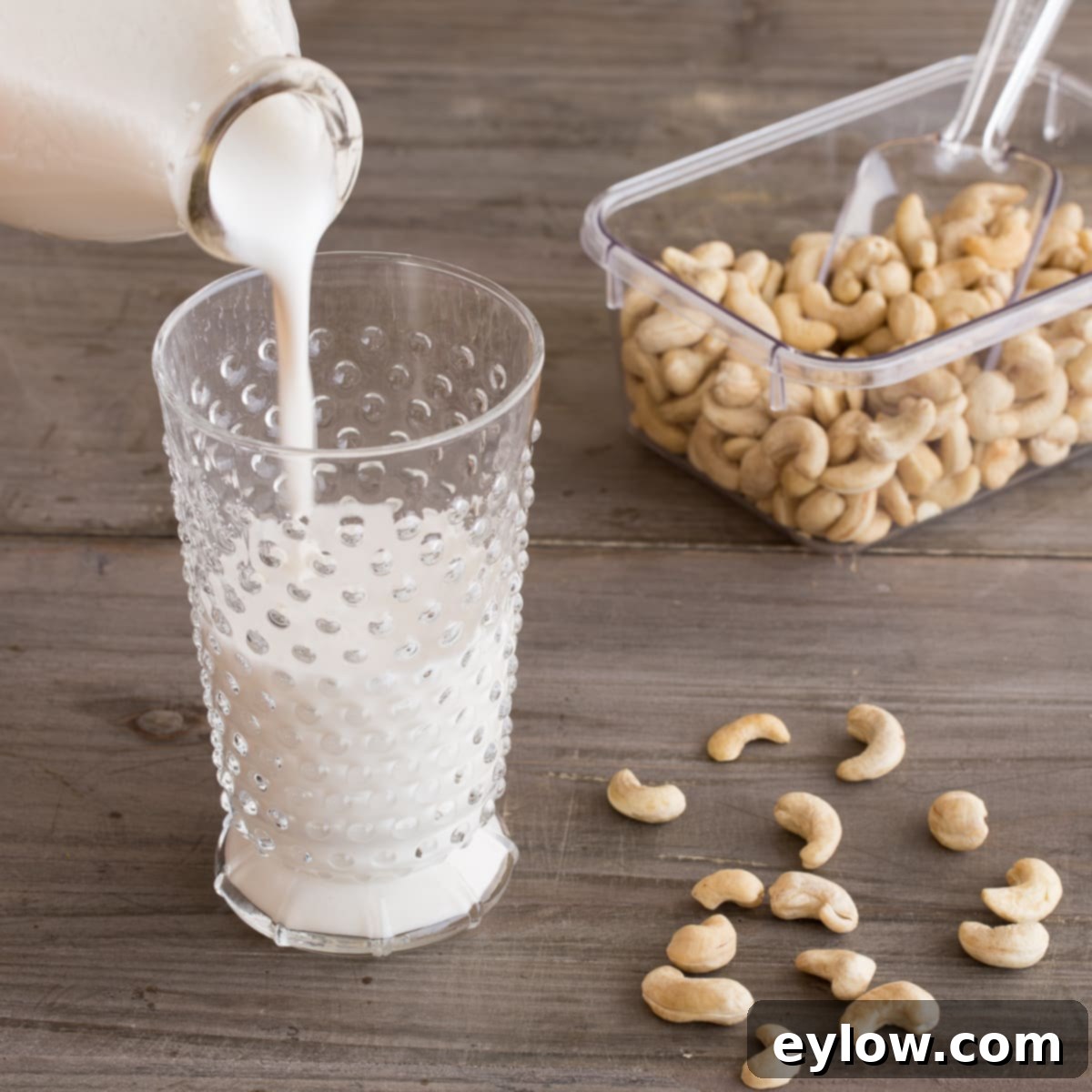Homemade Cashew Milk: The Ultimate Creamy & Easy Dairy-Free Recipe
In a world overflowing with plant-based alternatives, finding a dairy-free milk that truly satisfies can be a challenge. Store-bought options often come laden with thickeners, gums, artificial flavors, and unwanted sweeteners, compromising their nutritional value and taste. The good news? Crafting your own homemade cashew milk is surprisingly simple, incredibly versatile, and delivers a superior product that’s free from unnecessary additives. This guide will walk you through creating a luscious, creamy cashew milk that’s not only wholesome but also easily customizable to your exact preferences. Say goodbye to the compromises of commercial milk alternatives and embrace the pure, rich flavor of fresh, homemade nut milk. Whether you’re a seasoned plant-based enthusiast or just exploring dairy-free options, this cashew milk recipe is a game-changer, offering a velvety texture that’s perfect for everything from your morning coffee to your favorite smoothies, cereals, and even baking.
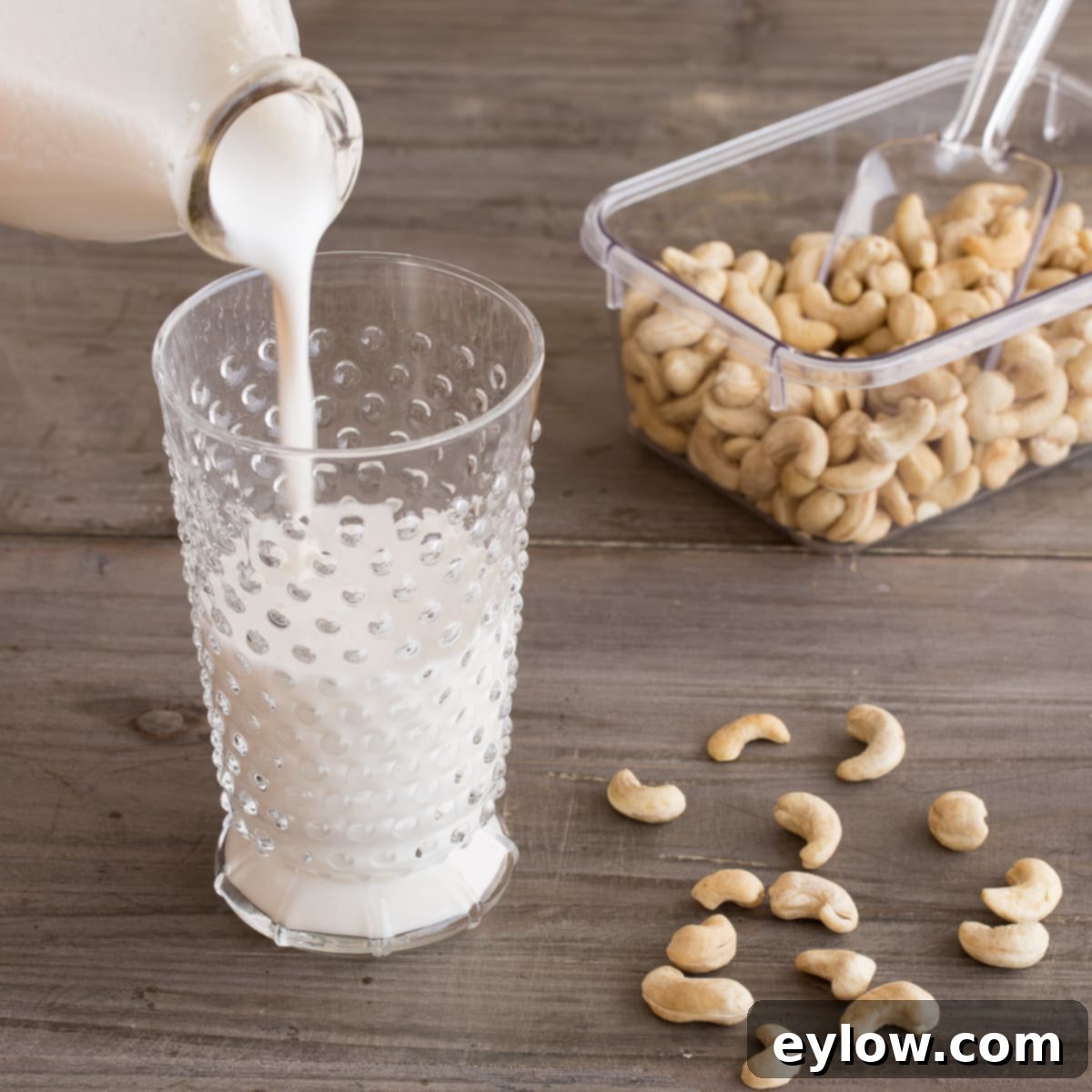
[feast_advanced_jump_to]
Why You’ll Love This Homemade Cashew Milk Recipe
Making your own cashew milk offers a myriad of benefits that go far beyond what you can find on store shelves. Here’s why this recipe will quickly become a staple in your kitchen:
- Unbeatable Flavor: Cashew milk boasts a naturally rich, subtly sweet, and incredibly creamy flavor profile that’s inherently delicious. Unlike some other nut milks, it has a wonderfully neutral taste that complements a wide array of dishes without overpowering them.
- A Superior Dairy & Almond Milk Alternative: If you’re looking to reduce dairy consumption or find almond milk too thin or too nutty, cashew milk is an exceptional choice. Its inherent creaminess makes it an ideal substitute in recipes where you crave a richer texture, mimicking dairy milk more closely than many other plant-based options.
- Clean Ingredients, No Additives: The biggest advantage of homemade cashew milk is complete control over what goes into it. You get pure, unadulterated cashew goodness without any emulsifiers, stabilizers, gums (like guar gum or xanthan gum), or processed sugars often found in commercial products. This means a cleaner, healthier, and more natural beverage for you and your family.
- Incredibly Easy to Make: Don’t be intimidated by the idea of making your own nut milk. This recipe is straightforward, requiring minimal effort and just a few basic ingredients. The process is quick, especially since cashews are softer and blend more easily than other nuts.
- Highly Customizable: From unsweetened to subtly sweet, plain to spiced, you can tailor your cashew milk to perfectly suit your taste buds and the specific application. Add a dash of vanilla, a hint of cinnamon, or a natural sweetener for endless delicious variations.
This homemade cashew milk is not only delicious on its own but also fantastic in a variety of culinary applications. For instance, it’s an excellent base for a vibrant chocolate banana smoothie, providing a smooth texture and rich flavor that store-bought versions simply can’t match.
Essential Cashew Milk Recipe Ingredients
One of the beauties of homemade cashew milk is its simplicity. You only need a few high-quality ingredients to create a truly exceptional product. Investing in good ingredients will significantly impact the final taste and texture of your milk.
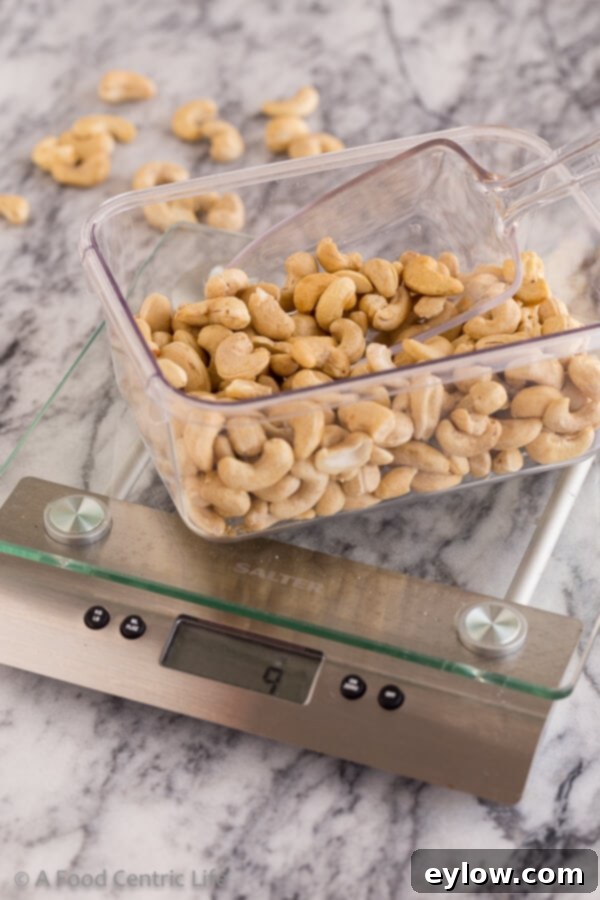
- Raw Cashews: This is the star ingredient, and quality matters! Always opt for raw cashews, not roasted or salted. Roasted cashews will impart a different, stronger flavor and may not blend as smoothly, while salted cashews will obviously make your milk savory. Raw cashews yield the cleanest, creamiest, and most neutral-tasting milk. Look for whole or large pieces if possible, as they tend to be fresher.
- Filtered Water: Since water makes up the bulk of your cashew milk, its quality is paramount. Using filtered or bottled water ensures your milk tastes clean and pure, free from any tap water impurities or chlorine tastes. This simple step makes a noticeable difference in the final product.
- Vanilla Extract (Optional): For a classic, comforting flavor, a splash of pure vanilla extract is highly recommended. It adds a subtle sweetness and depth that elevates the taste of your homemade cashew milk, making it even more enjoyable to sip on or use in sweet recipes.
For precise measurements and detailed nutritional information, please refer to the comprehensive recipe card below. If you’re exploring other nutritious non-dairy options, consider trying homemade hemp milk. It’s renowned for its high protein content and takes less than a minute to prepare, offering another fantastic plant-based alternative.
Customizing Your Cashew Milk: Substitutions and Variations
One of the greatest joys of making homemade cashew milk is the freedom to customize it. You can easily adjust the sweetness and flavorings to match your personal preferences or specific culinary needs. Here are some delightful and flavorful ways to enhance your cashew milk recipe, transforming it into a personalized dairy-free delight:
- Natural Sweeteners: For those who prefer a touch of sweetness, natural options are ideal and can be blended directly into the milk.
- Dates: Pitted Medjool dates are a fantastic choice. When blended, they impart a rich, caramel-like sweetness and a slight thickness that’s utterly delicious. Start with one or two dates and adjust to your desired sweetness.
- Maple Syrup: A classic sweetener that adds a subtle, earthy, and warm sweetness. It pairs beautifully with cashew’s creamy notes. Consider using a zero-sugar maple syrup alternative for a low-carb option, which I personally use and highly recommend.
- Honey: A timeless and versatile sweetener, honey offers a distinct floral sweetness. For those monitoring sugar intake, a zero-sugar honey alternative can be a great substitute.
- Other Options: Agave nectar provides a neutral sweetness, while brown rice syrup offers a malty flavor. For convenience, a homemade simple syrup (sugar and water solution) can also be used.
- Flavorings: Elevate your cashew milk with an array of aromatic additions.
- Spices: Warm spices are perfect for cozy drinks or seasonal recipes. Try cinnamon (a classic pairing!), cardamom, clove, ginger, allspice, or a ready-made pumpkin spice blend for a festive touch. These can be added as powders or infused subtly.
- Vanilla: Beyond vanilla extract, consider using vanilla bean paste for a more intense and authentic vanilla flavor, complete with speckles. A few drops of almond extract can also add a delightful, marzipan-like nuance.
- Citrus: For a refreshing, uplifting twist, add a bit of fresh lemon zest or orange zest. Ensure you only use the colored part of the peel, avoiding the bitter white pith.
- Chocolate: Transform your cashew milk into a decadent treat by blending in a tablespoon or two of unsweetened cocoa powder or cacao powder. It creates a rich, creamy, and wonderfully chocolatey beverage, perfect for hot cocoa or chocolate smoothies.
- Herbs: For an adventurous palate, fresh herbs can offer unique, refreshing flavors.
- Try fresh mint leaves for a cooling effect, especially in summer drinks.
- Dried culinary lavender leaves can impart a subtle, fragrant, and relaxing aroma. Use sparingly to avoid an overwhelming taste.
- Other Enhancements:
- A small pinch of salt, even in sweet recipes, can dramatically amplify and balance the overall flavor profile of your cashew milk.
- For a vibrant and earthy boost, blend in a teaspoon of matcha green tea powder. This creates a beautiful green milk with all the health benefits of matcha.
Once you’ve mastered the basic recipe, don’t hesitate to experiment with these variations. Imagine a spiced cashew milk latte, a vanilla-date cashew milk for your granola, or a chocolate cashew milk as a post-workout treat! This versatile milk is also fantastic in a refreshing 5-minute cherry smoothie recipe, offering a silky base for the fruit’s tartness.
Simple Recipe Instructions for Homemade Cashew Milk
Making your own cashew milk is incredibly straightforward and doesn’t require any advanced culinary skills. The key steps are soaking and blending, both of which are quick and easy. Follow these simple instructions for perfect, creamy cashew milk every time:
- Soak the Cashews: Begin by placing your raw cashews in a bowl or container. Cover them with cold filtered water, ensuring the water level is a few inches above the cashews. Cashews are softer than almonds and other nuts, so their soaking time is shorter, typically 4-8 hours. For best results and to prevent spoilage, refrigerate the cashews while they soak, especially if soaking overnight. Soaking softens the nuts, making them much easier to blend into a smooth, silky milk and aiding in digestion.
- Drain and Rinse: Once the soaking period is complete, drain off the soaking water completely. Give the cashews a quick rinse under cold running water. This helps remove any phytic acid or enzyme inhibitors that might have leached into the water, ensuring a cleaner taste and improved digestibility.
- Blend to Perfection: Transfer the drained and rinsed cashews to a high-speed blender. Add fresh filtered water to the blender. The typical ratio is 1 part cashews to 3-4 parts water, depending on your desired thickness and creaminess. For a rich, creamy milk, start with 4 cups of water for every 1 cup of cashews. Blend on high speed for about 30 seconds to 1 minute, or until the mixture is completely smooth and creamy. Unlike almond milk, cashew milk typically doesn’t require straining through a nut milk bag because cashews break down so thoroughly, leaving no discernible pulp behind. The result is a wonderfully silky-smooth, pourable milk.
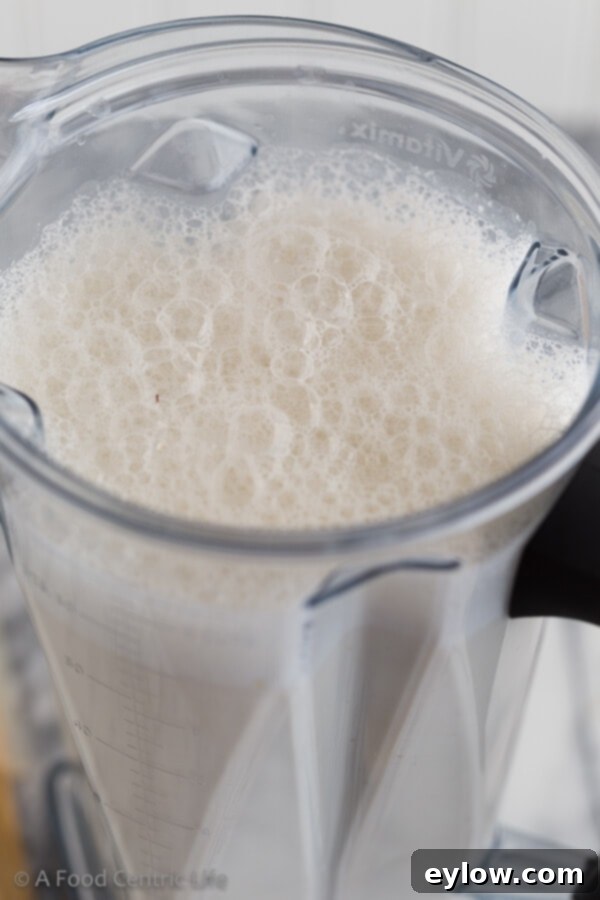
That’s all there is to it! You’ve just created fresh, additive-free cashew milk tailored to your taste. Store your homemade cashew milk in an airtight container in the refrigerator for 3-4 days. It’s normal for separation to occur, so give it a good shake before each use.
Nutrition: Cashews versus Almonds
When choosing between different plant-based milks, understanding their nutritional profiles can help you make an informed decision. Both cashews and almonds are incredibly healthy nuts, each offering a unique set of benefits. While both produce delicious non-dairy milks, they do have some distinct nutritional differences worth noting.
Heart-Healthy Fats: Both nuts are excellent sources of monounsaturated fats, which are known to be beneficial for heart health and can help lower bad cholesterol levels. Almonds tend to have a slightly higher content of these healthy fats compared to cashews.
Fiber Content: Almonds generally boast a higher fiber content than cashews. Fiber is crucial for digestive health, helps regulate blood sugar, and contributes to a feeling of fullness. However, when processed into milk, much of the fiber from both nuts is often lost, especially if the milk is strained.
Carbohydrates and Protein: Cashews are typically higher in carbohydrates than almonds, while almonds contain a little more protein. If you’re specifically tracking macros, these differences might influence your choice. However, both still provide a reasonable amount of plant-based protein and energy.
Vitamins and Minerals: This is where some of the more significant distinctions lie:
- Almonds Excel In:
- Calcium: Almonds are naturally richer in calcium, a vital mineral for bone health. Many commercial almond milks are also fortified with extra calcium to match dairy milk levels.
- Vitamin E: Almonds are an outstanding source of Vitamin E, a powerful antioxidant that helps protect cells from damage and supports skin health.
- Cashews Offer More Of:
- Zinc: Cashews are a good source of zinc, which plays a crucial role in immune function, wound healing, and DNA synthesis.
- Iron: They provide a notable amount of iron, essential for oxygen transport in the blood and preventing anemia.
- Magnesium: Cashews are particularly rich in magnesium, a mineral involved in over 300 enzymatic reactions in the body, including muscle and nerve function, blood glucose control, and blood pressure regulation.
Overall, both cashew milk and almond milk are healthy and nutritious plant-based options. Choosing between them often comes down to personal preference for taste, texture, and specific nutritional needs. Cashew milk, with its luxurious creaminess and unique mineral profile, offers a delightful and beneficial change of pace, making it a wonderful addition to your routine.
Chef’s tip: Weigh your cashews for accuracy. While measuring nuts by volume (e.g., cups) can be convenient, weighing them with an inexpensive digital kitchen scale is by far the most accurate method. This ensures consistent results every time, leading to perfectly creamy cashew milk with the ideal texture. A kitchen scale is an invaluable tool that I consider essential in my own kitchen, and I strongly encourage anyone who cooks regularly to invest in one. They are widely available at kitchen supply stores, discount retailers, and online, making them an accessible upgrade for any home cook.
Versatile Serving Suggestions for Cashew Milk
The beauty of homemade cashew milk lies in its incredible versatility. Its creamy texture and neutral flavor make it an excellent substitute for dairy milk or almond milk in nearly any application. Whether you prefer it plain or flavored, sweetened or unsweetened, this plant-based milk will quickly become a pantry staple. Here are just a few ideas for how to incorporate your fresh cashew milk into your daily routine:
- Enjoy it Cold: Serve it chilled, straight from the glass, just as you would any traditional milk. It’s wonderfully refreshing and hydrating on its own.
- Breakfast Staples:
- Cereal and Granola: Pour it over your favorite breakfast cereal, granola, or muesli for a creamy, satisfying start to your day.
- Overnight Oats & Bircher Muesli: It’s the perfect liquid base for high-protein overnight oats with chia seeds or traditional Bircher muesli, allowing the oats to absorb its rich flavor and creamy consistency.
- Smoothies: Cashew milk is a stellar base for any protein smoothie. Its creaminess adds body and richness without diluting the flavors of your fruits and vegetables.
- Hot Beverages:
- Coffee & Tea: Use it as a creamer for your morning coffee or tea. Its smooth texture creates a lovely foam for lattes and cappuccinos.
- Hot Chocolate: Whisk it with cocoa powder and a sweetener for a decadent homemade hot chocolate.
- Baking and Cooking:
- Baked Goods: Substitute cashew milk cup-for-cup for dairy milk in most baking recipes, such as pancakes, muffins, breads, and cakes, for a dairy-free twist.
- Soups and Sauces: Its creamy nature makes it excellent for thickening savory dishes like creamy soups (think tomato or mushroom soup), gravies, or pasta sauces, adding richness without heavy cream.
- Puddings & Custards: Create delightful dairy-free puddings, custards, or even ice cream bases.
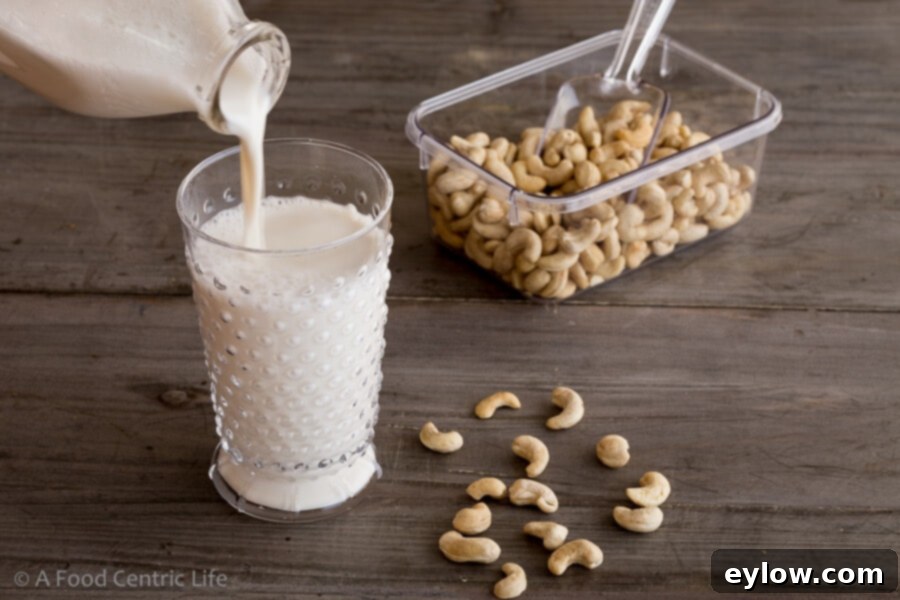
Experiment with different flavor combinations and see how beautifully this homemade cashew milk integrates into all your favorite recipes. It’s a truly versatile staple that enhances both sweet and savory dishes.
Cashew Milk Recipe FAQs
Here are some frequently asked questions about making and using homemade cashew milk, providing quick answers to common queries:
Yes, soaking raw cashews is a crucial step. It softens them significantly, ensuring a much smoother, creamier milk and easier digestion. While you might get away with not soaking for some blenders, it’s highly recommended for optimal texture and benefits.
For best results, soak cashews in cold water for 4-8 hours, or ideally overnight in the refrigerator. If you’re short on time, a quick soak in hot water for 15-30 minutes can also work, but an overnight soak yields the creamiest results.
While raw cashews are best for their neutral flavor and superior creaminess, roasted cashews can be used in a pinch. However, be aware that they will impart a more robust, toasted, and nutty flavor to the milk, which may not be desirable for all applications. Ensure they are unsalted.
Generally, no! This is one of the fantastic advantages of cashew milk. Unlike almond milk, cashews break down completely when blended, leaving behind no significant pulp. This means you get a naturally smooth, pulp-free milk without the extra step of straining with a nut milk bag.
Homemade cashew milk, without any preservatives, should be stored in an airtight container in the refrigerator and will stay fresh for about 3-4 days. Always check for any off-smells or discoloration before consuming.
Separation is completely normal for homemade nut milks! This simply means the fats and solids are settling. Just give your cashew milk a good shake or stir before each use to re-emulsify it.
Explore More Plant Milk Recipes
Discovering the ease and flavor of homemade plant-based milks opens up a world of possibilities in your kitchen. They’re not only simple to prepare but also provide a fresh, additive-free alternative to store-bought varieties. Plus, having a stash of nuts and seeds in your pantry means you’ll never run out of your favorite dairy-free options. Dive into these other delicious homemade plant milk recipes to diversify your dairy-free journey:
- Homemade Coconut Milk (from Canned in 1 Minute)
- Hemp Mylk (hemp milk recipe)
- Homemade Pumpkin Seed Milk (Dairy-free)
- How to Make Homemade Almond Milk
Did You Make This Recipe?
If you’ve whipped up a batch of this luscious homemade cashew milk, I would absolutely love to hear about your experience! Your feedback is invaluable and helps others discover the joys of making their own plant-based milks. Please take a moment to add your comment below. If you truly loved this recipe and found it helpful, a 5-star rating would be greatly appreciated! It makes a huge difference in helping other readers find and enjoy this wonderful recipe. Thank you for sharing your culinary journey!
📖 Recipe
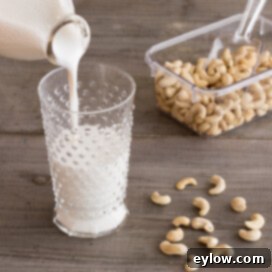
Creamy Homemade Cashew Milk Recipe
Sally Cameron
Pin Recipe
Equipment
-
High-Speed Blender
Ingredients
- 6 ounces raw cashews (about 1 full cup)
- Cold filtered water (to cover cashews for soaking)
- 4 cups fresh cold filtered water (for blending, yields approximately one quart of milk)
- Optional: 1 teaspoon vanilla extract
- Optional: Sweetener of choice (e.g., 1-2 pitted dates, 1-2 tbsp maple syrup, or a pinch of salt to enhance flavor)
Instructions
-
Soak the Cashews: Place the raw cashews in a clean container and cover them completely with cold filtered water, ensuring there are a few inches of water above the nuts. Cover the container and refrigerate for 4-8 hours, or ideally overnight, to soften them thoroughly.
-
Drain and Blend: After soaking, drain off the old soaking water and rinse the cashews briefly under cold tap water. Transfer the rinsed cashews to a high-speed blender. Add 4 cups of fresh cold filtered water to the blender, along with any optional vanilla extract or sweeteners you desire. Puree on high speed for 60 seconds (1 minute), or until the mixture is completely smooth and creamy. No straining is typically needed for cashew milk.
-
Store and Enjoy: Pour your fresh homemade cashew milk into an airtight bottle or jar. Store it in the refrigerator for up to 3-4 days. It’s normal for the milk to separate during storage; simply shake well before each use to re-combine.
Notes
Variations & Customization:
- For vanilla cashew milk, add 1 teaspoon of pure vanilla extract or a small amount of vanilla bean paste before blending.
- To sweeten your cashew milk naturally, blend in 1-2 pitted Medjool dates, 1-2 tablespoons of maple syrup, or honey. Adjust to your desired level of sweetness.
- For a no-added-sugar option, use a monk fruit blend or a monk fruit simple syrup.
- While not typically necessary for cashew milk, if you prefer an absolutely pulp-free texture, you can pour the blended milk through a fine-mesh sieve or a dedicated nut milk bag.
- Consider adding a pinch of salt to enhance the overall flavor, even in sweet applications.
- Experiment with other flavors like cinnamon, cardamom, or a touch of cocoa powder for a chocolatey treat.
